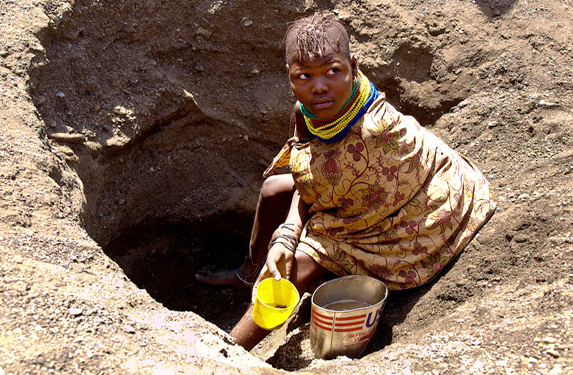Editor’s Note: John Oldfield, CEO of WASH Advocates, reminds us universal safe drinking water requires the political will of leaders globally, and political will is a function of an expectant and educated citizenry. That is not as obvious as it sounds. Do your senators and representative know you expect clean water? John’s concern is the dual crisis of water and sanitation that has plagued the developing world for decades. After his post we ask him what the U.S. should do to help, a topic he will address on August 1 in a hearing on The Impact of U.S. Water Programs on Global Health before the House Foreign Affairs Subcommittee on Africa, Global Health, Global Human Rights, and International Organizations. We met John (virtually) through Alexandra Dapolito Dunn who reported to EarthDesk on the panel he moderated at World Justice Forum IV, where the post below also appears. More about John and WASH Advocates at the conclusion. — John Cronin

By Oxfam East Africa (Flickr: Muddy Water) [CC-BY-2.0], via Wikimedia Commons
Yet even though the world has never been richer, smarter, or more abundant than it is in 2013, there remain over 783 million people without access to safe drinking water, and 2.5 billion people without a safe place to go to the bathroom.
So why does this fundamental global safe drinking water and sanitation challenge continue to exist, when we have known how to solve this problem for millennia? Why do hundreds of millions of women around the world continue to be exploited as water and wastewater infrastructure, and why do millions of children under the age of five die from preventable waterborne diseases each year?
If there are to be permanent and sustainable solutions . . . politics and political leaders must drive the solutions.
My answer: a lack of political will. And that answer is typically the quickest way to end a conversation, as most people look at politics and elected officials only as part of the problem, not as a key part of the solution.
Politics are indeed problematic in many instances, yet if there are to be permanent and sustainable solutions to the world’s most pressing development challenges, politics and political leaders must drive the solutions, not just be invited to ribbon-cutting ceremonies to new water treatment facilities.
I had dinner a couple of years ago with a handful of other non-profit leaders and the former prime minister of a sub-Saharan African country. I asked the prime minister: “What made it possible for you to strengthen policies and increase your national budget for safe drinking water, sanitation and basic public health while you were in office?”
He told me that to do so he needed two very simple things:
– He needed to hear about the problem from his own people.
– He needed to see how the problem is solvable.
Using that as a benchmark, how can we make it possible for each government around the world to prioritize safe drinking water and sanitation? I suggest – as the prime minister said – that we in civil society, in developed and more importantly in developing countries, must let our governments know this is an important issue for us – their constituents – and that the challenge is solvable. And let’s take it one step further: to strengthen political commitments and rule of law for water, we need to show our governments not just that the problem is solvable, but that it is already being solved, and we simply need their support to solve it more quickly, equitably, and sustainably. We need politicians not so much to lead on this but simply to follow what their constituents are already doing by supporting and complementing our efforts with stronger policies and increased budgets. [The World Justice Project offers more information about “rule of law.”]
What was once unavoidable–millions of deaths due to waterborne disease–is now unacceptable.
This approach to building political will and commitments has proven successful around the world and across the ages. Former U.S. President Franklin Roosevelt was president of the United States in the 1930s and 1940s. In the 1930s, during the Great Depression, progressive leaders came to President Roosevelt and asked for various concessions, including new pro-worker policies as part of the effort to turn the economy around. President Roosevelt was quite progressive and pro-union, and he is reported to have said: “I want to do what you are asking me to do, but I can’t do it politically yet. I need you to go out there and make it possible for me to enact those policies.”
So the union leaders did just that: In 1937 there were thousands of labor actions whose impact on the economy made it possible for President Roosevelt to do what he already wanted to do.
We do not need to strike for water and sanitation. I do however assert that the job of civil society – including my organization – in the developed and developing world is to demonstrate to governments that what was once unavoidable–millions of deaths due to waterborne disease–is now unacceptable. That simple equation will provide those elected officials with the political cover they need to do what they already want to do, and progressively realize the human right to water and sanitation to everyone on the planet in a tighter timeframe.
Today, the risk of making massive political commitments to water and sanitation remains for the most part too high, because water and sanitation compete with so many other important development priorities (roads, schools, hospitals, jobs) that are in many cases in higher demand.
The rule of law community and the water and sanitation community have an opportunity work together to be a highly catalytic part of the solution to the world’s water crisis. Access to safe drinking water strengthens rule of law, in that local water and sanitation committees often provide citizens in developing countries – particularly women – their first opportunity to be involved in a democratic process that concerns their own well-being. And as local leaders across the globe provide more clear guidance about water and sanitation governance and legal underpinnings, their constituents will have access to drinking water that is safe, affordable, sustainable, and equitable.
Access will be universal and equitable, pricing will be fair for all users, infrastructure will be sustainable, and the rule of law will be strengthened as governments provide services and citizens uphold their end of the social contract.
My ambition is that rule of law and water communities will find more ways to work together across a number of platforms, and that both communities will emerge stronger from those collaborative efforts.
EarthDesk: What should be the role of the United States in achieving universal sanitation and clean water?
John Oldfield: I am actually preparing some congressional testimony for a hearing on The Impact of U.S. Water Programs on Global Health on August 1, with the following asks:
- Fully fund the Water for the Poor Act of 2005: the current level is $315m/year, and we are aiming for $400m for FY14
- Sponsor and pass the soon-to-be-introduced Water for the World Act of 2013, a follow on to the Water for the Poor Act.
- Implement the newly-launched USAID Water and Development strategy in a fashion that:
– Prioritizes the world’s poorest countries and communities (e.g. subSaharan African countries).
– Supports programming that is decentralized (demand-driven) and genuinely sustainable and appropriate in technical, financial, and sociocultural terms.
– Includes significant monitoring and evaluation for resolution and learning (MERL), particularly after the technical stages of water projects are completed.
– Positions water as a complement to other equally important development objectives: e.g. safe drinking water will make antiretrovirals for HIV+ persons more effective; better sanitation will decrease diarrheal transmission rates, leading to better nutrition and physical growth/cognitive development.
«« »»
 John Oldfield is CEO of the non-profit WASH Advocates (More on WASH below). He is the former Executive Vice President of Water Advocates, dedicated to increasing support for worldwide access to safe drinking water and adequate sanitation. John is the former Vice President at a New York private equity firm specializing in leveraged buyouts and corporate divestitures. He has also served with the National Academy of Sciences, where he researched science, technology, and economic policy issues. More here
John Oldfield is CEO of the non-profit WASH Advocates (More on WASH below). He is the former Executive Vice President of Water Advocates, dedicated to increasing support for worldwide access to safe drinking water and adequate sanitation. John is the former Vice President at a New York private equity firm specializing in leveraged buyouts and corporate divestitures. He has also served with the National Academy of Sciences, where he researched science, technology, and economic policy issues. More here

WASH Advocates is dedicated to helping solve the global safe drinking water, sanitation, and hygiene (WASH) challenge. Its mission is to increase awareness of WASH issues and solutions, and to increase the the amount and effectiveness of resources devoted to those solutions throughout Africa, Asia, and Latin America. More here.









